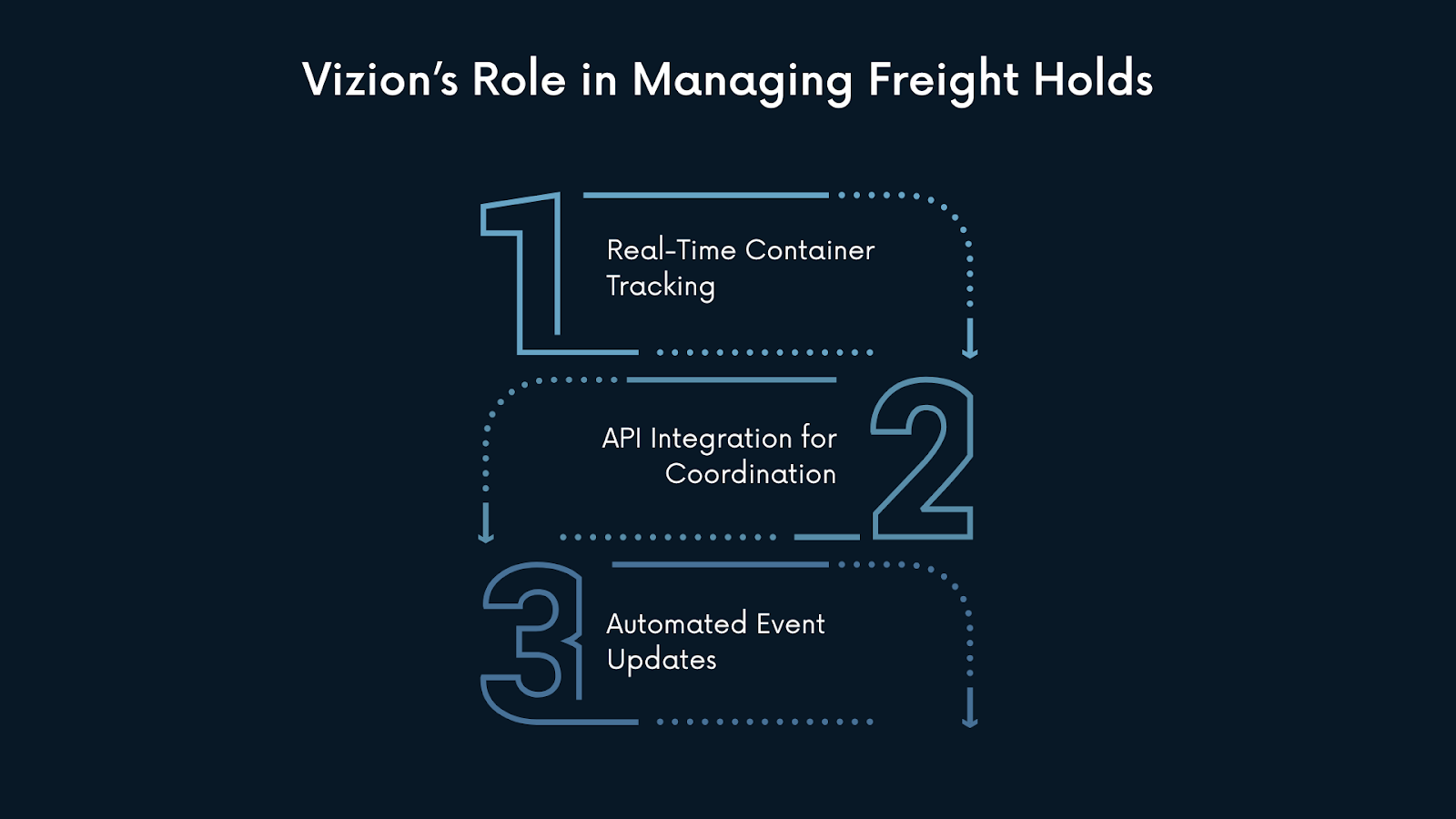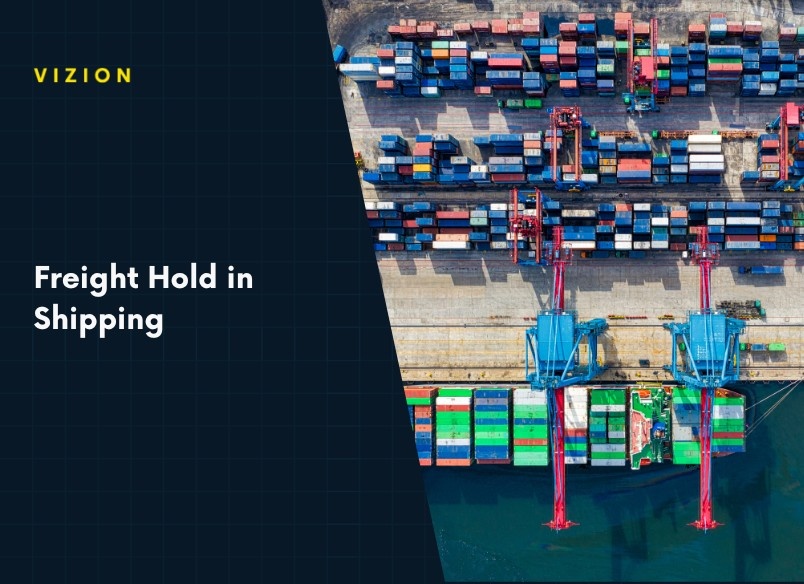Freight holds are a significant issue in container shipping, often causing unnecessary delays and additional costs. The global average delay for late vessel arrivals has increased from approximately 5 days in 2023 to over 6.5 days in 2025. This reflects growing inefficiencies in shipping schedules.
These delays often result in containers being held at ports due to congestion, unpaid charges, or customs inspections, disrupting the smooth flow of goods.
Unpaid fees, like the bunker surcharge NOS, can contribute to these delays, further complicating the shipping process. By utilizing advanced tracking and real-time data solutions like Vizion, businesses can ensure smoother operations throughout the supply chain.
What Is a Freight Hold?
A freight hold is a restriction placed by the Steamship Line (SSL) on a container due to unresolved fees or regulatory issues. These fees may include demurrage, dwell charges, customs exam fees, or other outstanding payments that must be settled before the container is released from the port or terminal.
Top Reasons for Freight Holds
Freight holds are imposed to resolve all costs and regulatory requirements before a container is released. Delays and disruptions occur when these issues remain unresolved. Here are the top reasons for freight holds:
- Unpaid Terminal Fees: Fees related to container handling or storage at the terminal that have not been paid.
- Demurrage: Charges incurred when containers stay at the port beyond the allowed free time.
- Incomplete or Illegible Documentation: Missing or unclear paperwork, such as Bills of Lading or invoices, hinders clearance.
- Statistical Validation: Issues with the required shipment data needed for regulatory purposes.
- Customs Commercial Enforcement: Delays caused by customs enforcement checks on imported goods.
- Customs Vehicle and Cargo Inspection System (VACIS): Inspections are required for certain shipments, delaying container release.
How Does Freight Hold Impact the Supply Chain?
Freight holds can have a far-reaching effect on the entire supply chain, impacting various aspects of shipping and operations. Here’s how:
- Delays in Container Release: Freight holds result in delays in the movement of goods. These holds prevent the timely release of containers, resulting in disruptions to shipping schedules.
As containers stay at ports longer than expected, it triggers a ripple effect, slowing down the overall delivery timeline.
- Financial Costs: Extended holds come with a significant price tag. When containers are delayed, additional fees like demurrage and detention charges accumulate.
These fees can substantially increase the overall cost of shipping, affecting profitability and potentially making specific shipments less cost-effective to manage.
- Customer Experience: Shipping delays directly impact customer satisfaction. Late deliveries frustrate customers, tarnish their experience, and can lead to lost business opportunities.
Customers who don’t receive their goods on time may look elsewhere for more reliable suppliers, which in turn harms long-term relationships and impacts revenue.
Managing and Resolving Freight Holds With Vizion
Freight holds are often caused by unresolved fees, documentation issues, or regulatory holds, all of which disrupt the timely release of containers and lead to delays in the supply chain. Managing these holds efficiently involves addressing several key areas: payment management, coordination, proactive tracking, and effective communication.
Let’s break down how these challenges can be resolved and how Vizion’s solutions can play a critical role in overcoming them.
1. Payment of Outstanding Fees
Ensuring that all outstanding charges, like demurrage, bunker surcharges, and customs-related fees, are cleared before the container is released is critical to preventing freight holds.
- Stay on Top of Payment Deadlines: Ensure that all outstanding fees are settled quickly to avoid unnecessary delays caused by unpaid charges.
- Clear Fees Promptly: Prioritize clearing demurrage, detention, and bunker surcharges to avoid the imposition of freight holds that would prevent container release.
2. Coordination with Steamship Lines and Customs
Effective coordination between Steamship Lines (SSLs), customs authorities, and all relevant stakeholders is key to expediting container release. Communication is essential to ensure timely and accurate documentation submission.
- Ensure Accurate Documentation: Timely and accurate submission of required documents, like Bills of Lading, invoices, and customs declarations, is necessary to avoid regulatory holds and delays.
- Coordinate Across Stakeholders: Regular communication with SSLs and customs ensures the timely resolution of potential issues, preventing delays in container release.
3. Proactive Monitoring
Frequent monitoring of payment statuses, documentation accuracy, and the overall process can prevent unexpected freight holds. By tracking key metrics and events, businesses can address potential issues before they escalate into bigger delays.
- Track Payment and Document Status in Real-Time: Regular tracking of container status, fees, and documents ensures that businesses stay ahead of any issues that might lead to a freight hold.
- Act Early to Prevent Delays: Identifying discrepancies early in the process allows businesses to resolve issues proactively, preventing them from snowballing into freight holds.
The Role of Bunker Surcharge NOS in Freight Holds
The Bunker Surcharge NOS is a fee that shipping companies apply to cover the cost of fuel. Since fuel prices fluctuate in response to global market conditions, this surcharge is necessary for maintaining stable shipping operations.
- Purpose: It helps offset the unpredictable costs of fuel in shipping operations.
- Impact of Unpaid Surcharge: If left unpaid, it can result in a freight hold, preventing the release of containers.
How Bunker Surcharge NOS Leads to Freight Hold
When the bunker surcharge NOS remains unpaid, shipping companies will place a freight hold on the container. This hold ensures that all required fees are cleared before the container can be released from the port or terminal.
- Container Hold: The shipping company withholds the release of the container until the outstanding bunker surcharge is paid.
- Disruption: Freight holds can cause the container to remain stuck at the port, delaying the overall shipment process.
Impact on Shipping Timelines
Unpaid bunker surcharges contribute to delays, which can disrupt shipping timelines and result in additional costs. Here's how it affects the entire process:
- Increased Delays: Freight holds result in delayed container release, leading to slower shipping times.
- Additional Costs: As containers are held, additional charges such as demurrage fees and storage costs start to accumulate.
- Disrupted Schedules: Shipping timelines become unpredictable, making it challenging to meet delivery deadlines.
Vizion’s Role in Managing Freight Holds

Vizion’s real-time tracking, automated updates, and API integration directly address the challenges that lead to freight holds. With complete visibility into container movements and associated fees, businesses can stay ahead of issues and avoid delays.
1. Real-Time Container Tracking
Vizion’s real-time tracking ensures businesses have complete visibility of their containers’ journey across the ocean.
Real-time tracking enables businesses to stay informed about the status of their containers and any associated fees, allowing them to take timely action and prevent holds.
2. API Integration for Coordination
Vizion integrates easily with existing systems, like TMS and ERP, enabling businesses to track and manage their shipments efficiently. By integrating payment tracking with internal systems, Vizion helps to streamline communication and ensure that all necessary documentation and payments are completed on time.
- Centralized Data for Better Communication: Vizion’s API centralizes data from various stakeholders (SSLs, customs, ports) for better communication and ensures that everyone is on the same page.
- Efficient Tracking and Payment Status Updates: Businesses can track the payment status of their containers directly from their internal systems, helping to avoid delays caused by incomplete documentation or unpaid charges.
3. Automated Event Updates
With Vizion’s automated event tracking, businesses are notified of critical changes in the status of their shipments, including any updates on potential holds. This ensures timely intervention to prevent delays from becoming larger disruptions.
- Instant Notifications: Automated updates notify businesses about potential issues with documentation or payment, allowing them to resolve the problems quickly.
- Prevent Delays with Early Intervention: By receiving early alerts on the status of containers, businesses can resolve problems quickly and avoid costly freight holds.
By incorporating Vizion’s solutions, businesses can avoid the challenges that lead to freight holds and resolve issues quickly.
Final Thoughts
Freight holds are a significant challenge in container shipping, often resulting from unpaid fees, regulatory holds, or incomplete documentation. These delays disrupt the supply chain, increase operational costs, and hurt customer satisfaction. Managing freight holds effectively is critical to maintaining smooth operations and avoiding costly delays.
With Vizion, you can minimize these disruptions by ensuring real-time tracking, automating event updates, and integrating your systems to avoid documentation errors. Our comprehensive solutions help you avoid potential freight holds, keeping your shipments moving efficiently.
- 99% of ocean shipments are tracked globally with comprehensive, standardized, and validated tracking events.
- 99.99% uptime performance, ensuring your data is always accessible.
- Over 300 million events processed across a vast network of ocean and rail shipments.
- 7,000 unique events turned into 60 standardized milestones, making tracking more transparent and actionable.
Start using Vizion’s solutions to optimize your freight operations. Book a demo today!



%20-%202026-01-22T154931.625.png)
%20-%202025-12-03T153209.004.png)
%20-%202025-12-03T102433.766.png)














